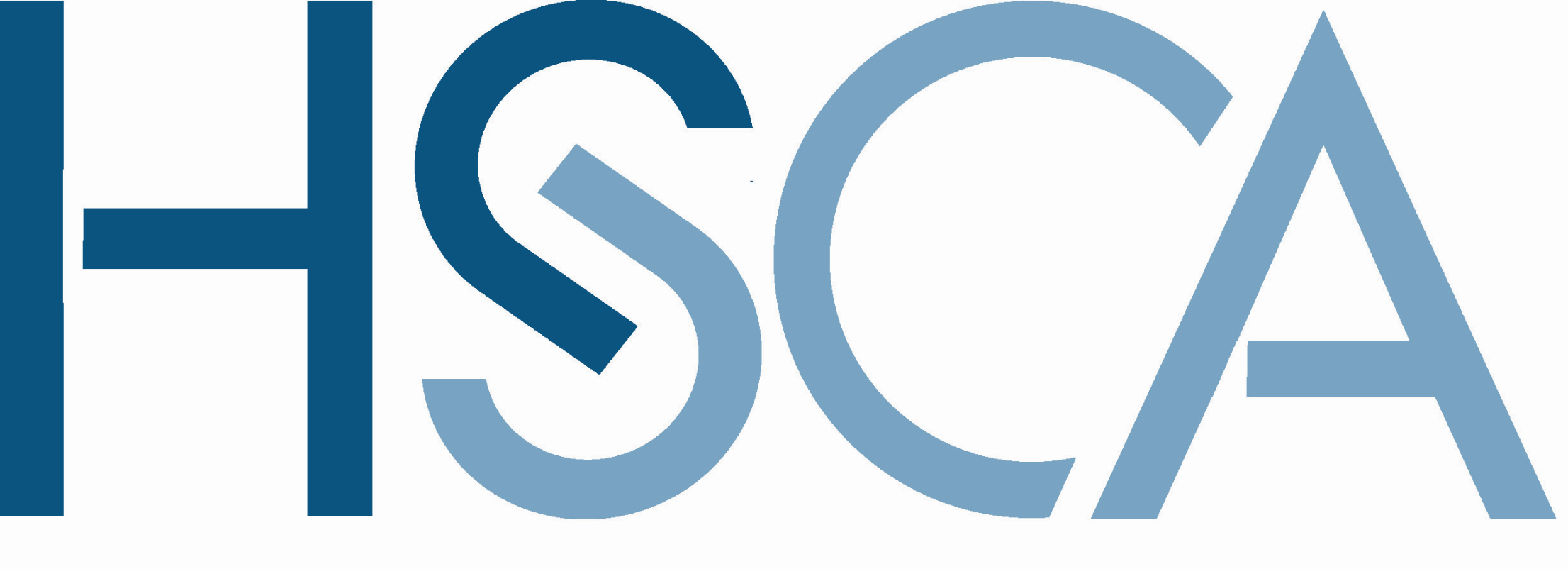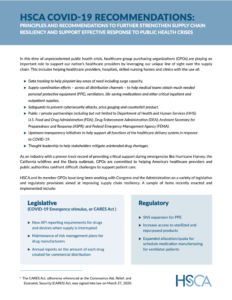In this time of unprecedented public health crisis, healthcare group purchasing organizations (GPOs) are playing an important role to support our nation’s healthcare providers by leveraging our unique line of sight over the supply chain. As an industry with a proven track record of providing critical support during emergencies like Hurricane Harvey, the California wildfires and the Ebola outbreak, GPOs are committed to helping America’s healthcare providers and public authorities confront difficult challenges to support patient care. HSCA and its member GPOs have long been working with Congress and the Administration on a variety of legislative and regulatory provisions aimed at improving supply chain resiliency. Below are HSCA’s principles and recommendations to further strengthen supply chain resiliency and enable an effective response to public health crises:
HSCA Principles and Recommendations to Further Strengthen Supply Chain Resiliency
Personal protective equipment (PPE) is critical for frontline healthcare workers to effectively treat and prevent the spread of the coronavirus. All stakeholders must work to help appropriately anticipate needs and preserve PPE and other critical products for healthcare providers to help avoid disruption. GPOs are working alongside hospitals and other providers to provide critical support and equip them to prepare for surge needs in response efforts. Access to timely information in advance of an emergency is critical to strengthening supply chain resiliency. HSCA and its member GPOs continue to support policy solutions that not only enable FDA and other authorities to have greater visibility into the source and location of manufacturing of medical products, but also permit access to that information in advance of a public health emergency. This will enable FDA and other supply chain stakeholders to plan for and identify potential shortages, consider back up supply, and take measures to help mitigate and respond to shortages before they occur. We note the CARES Act included strengthened reporting requirements for manufacturers, including certain information about active pharmaceutical ingredients and other raw materials, to better prevent, assess and address shortages of medical products needed for patient care in the U.S. The SNS plays an important role as a partner in response efforts, serving as a stopgap in crises like the coronavirus pandemic. Policymakers should make sure the SNS has access to the resources and funding it needs as critical to both the public health and national security response capability. Efforts should also be coupled with long term solutions, such as ramp up of manufacturing and streamlined distribution to where it is needed most. HSCA and our member GPOs are committed to preventing and mitigating prescription drug shortages and ensuring continued patient access to essential medications. HSCA supports FDA efforts to prevent and mitigate drug shortages, and we encourage FDA to expand its list of drug shortages to include drugs that are experiencing significant national – as well as regional shortages – based on strength and dosage. FDA should also be provided access to critical data regarding inventory levels for essential medications (e.g., antibiotics and antivirals) to help gauge capacity levels and ramp up production when needed. Certain controlled substances including morphine, hydromorphone, and fentanyl are a medical necessity in the acute care setting. While DEA has acted quickly to temporarily increase aggregate production quotas, DEA should increase quotas more broadly for injectable narcotics as part of institutional care to help prevent and address shortages. Additionally, HSCA encourages DEA to outline an efficient, timely process for adjusting production quotas in the event of shortages to help ensure DEA has the flexibility to act swiftly to ensure we are not delaying care. HSCA supports solutions that strengthen supplier resiliency and redundancy to help prevent disruptions to supply. Increasing supply chain diversification is essential for helping the United States avoid overreliance on any particular geographic location. The global nature of the supply chain should be leveraged to build in redundancies, shoring up domestic manufacturing as well as sourcing in various geographical locations to help prevent supply disruptions that can occur domestically or internationally. Previous shortage issues due to manufacturing issues or natural disasters like Hurricane Maria make it clear that it is important to have sourcing and manufacturing capabilities both domestically and globally to help ensure multiple suppliers and ability to scale up as needed. In order to increase domestic manufacturing, consider manufacturer incentives such as: For example, GPOs have helped bring new or expanded products to market with manufacturers through committed volume to help support manufacturer investment and long-term marketplace sustainability. Increased collaboration and communication among all stakeholders is critical during national emergencies. Emergency response involves a lot of moving parts, and ongoing coordination and communication is key to timely and needed care of patients by providers. GPOs have been working closely in partnership with public and private stakeholders – including the Strategic National Stockpile, HHS, FEMA, FDA, hospitals, health systems, and others – to help ensure a coordinated and comprehensive response to the coronavirus pandemic, and keen understanding of healthcare provider needs. For example, GPOs played an important role in facilitating creation of the Dynamic Ventilator Reserve, a new public-private effort with the hospital community and FEMA to aid in distributing ventilators to critical areas in the fight against COVID-19. Access to timely information and data is critical for ensuring that healthcare providers have the products they need when they need them. For example, demand spikes in the case of the COVID-19 pandemic spotlight the need for healthcare providers to treat patients quickly and efficiently. Accurate understanding of emerging needs is essential. GPOs are fierce proponents of using data to help their provider partners and public authorities prepare for, and respond to, public health threats and emergencies. As part of these efforts, understanding real-time needs plus capacity demands is critical to preparing, responding, and mitigating shortages, which is why GPOs have created platforms to track supply and inventory levels in real-time. Additionally, national emergencies require new thinking about allocation processes. GPOs understand the importance of making informed sourcing decisions aligned to current and anticipated needs. Public and private stakeholders need to have dynamic processes to help ensure products are directed to where they are needed most. For example, GPOs have been working in partnership with suppliers, distributors and the federal government on strategies to gather critical data across industry to help track and project hot spots, treatment capacity and required medical supplies during the COVID-19 pandemic. GPOs support competition and work to identify and bring new suppliers to market through technology breakthrough programs, supplier innovation summits, and more to ensure continued access to essential medications and products. Policymakers should pursue solutions that increase competition and encourage new entrants to the marketplace to help strengthen supply chain resiliency while reducing healthcare costs for patients and providers. As public and private stakeholders work to provide critical supplies to help providers during the COVID-19 pandemic, ensuring the integrity of the supply chain and the quality of products is more important than ever. HSCA and its member GPOs are committed to protecting patients from counterfeit drugs or devices that could cause serious harm. We support policy solutions like the Safeguarding Therapeutics Act, which enhances FDA’s authority to destroy counterfeit drugs and medical devices at American ports of entry, preventing such products from entering the supply chain and helping to ensure a safe and reliable supply of products. 1. Ensure Adequate Supplies of PPE for Healthcare Workers on the Front Lines
2. Enhance Upstream Transparency to Strengthen Supply Chain Resiliency in Advance of Emergencies
3. Ensure the Strategic National Stockpile (SNS) Has Adequate Resources
4. Expand FDA Drug Shortage List and Monitor Inventory Levels of Critical Drugs to Guard Against Shortages
5. Increase Aggregate Production Quotas to Mitigate Injectable Narcotic Shortages
6. Support Capacity Through Increased Supply Chain Diversification
7. Foster Supply Chain Collaboration and Communication Among Public and Private Stakeholders
8. Increase Access to Timely Information to Help Leverage Data to Inform Response and Allocation Efforts
9. Encourage Competition and the Introduction of New Suppliers into the Marketplace
10. Safeguard the Supply Chain from Counterfeit Products

